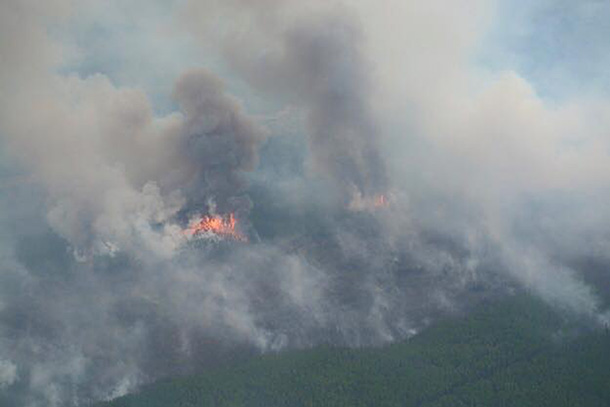Canada's prime minister is pre-campaigning with a strong-on-security message. His government is taking measures designed, among other goals, to protect energy infrastructure from what the RCMP has called "violent environmental extremists."
As I write, enormous forest fires burning out of control across northern Alberta have done what no activist has accomplished: forced the suspension of oilsands operations.
These events capture a dimension missing from Canada's security debate: our natural security.
Our natural security is physical. It provides the stable, productive environment that has allowed Canada to prosper. In the form of fields and lakes and forests, and in global exchanges of water and energy, natural security underwrites our economy, our health and our ability to maintain the institutions that serve and protect us.
Every one of Canada's governments since 1989, including the present one, has expressed strong environmental principles and enacted impressive legislation to protect vulnerable species, defend Canadians against pollution and prevent development from devastating critical ecosystems.
Despite those laws, audits and independent assessments persistently warn us that our natural security is degraded, failing and increasingly undefended. And that should concern Canadians of all political stripes.
The wide gap between our aspirations and actions confronted me again and again as I sought an answer to an apparently straightforward question: "How well has Canada cared for our environment -- really?"
The year-long search was commissioned by Tyee Solutions Society, an independent journalism production centre started by the founders of this publication and donor-supported. It collated events, laws, international developments and a wide range of public audits and independent assessments over a period in which five prime ministers from three parties occupied 24 Sussex Drive. All of that information is now available and searchable online.
A short answer
For a more complete answer to the question of how we've cared for Canada's environment over that time, visit Bottom Lines: A Quarter-century Report on Our Natural Security.
But the short answer is this: Not well at all.
Over the 25 years from 1989 to 2014, state-of-the-art laws to protect the safety of air and water and critical natural systems, have never been fully implemented or effectively enforced. Many of the goals set in legislation or treaty commitments remain unmet.
Twenty-five years ago, Canada lacked mandatory standards for air and water quality to match those then in place for over a decade in the United States. We still lack them.
The consequences of multi-partisan neglect are now becoming apparent.
Air and water quality and toxic chemical threats were at the top of Canadians' environmental concerns in polls conducted in 1989. They remain so. On that score, ground smog is a bright spot: it has widely declined. Most provinces tightened their rules after farm waste contaminated water taps on Walkerton, Ont., killing seven and sending scores to the hospital.
Missing babies
But new and more elusive chemical threats have replaced older biological ones in our water. Sampling reveals scores of pharmaceutical residues in every Canadian river, wetland and drinking water reservoir tested from coast to coast. Of 23,000 "chemicals of concern" in daily use in Canada, information on the toxicity of nearly nine out of 10 is simply missing, the Council of Canadian Academies warned in 2012.
Meanwhile, doctors observe an ongoing decline in the number of Canadian boys being born in comparison to girls -- equivalent to about 800 "missing" baby boys a year by 2010. Genital defects and cancers of the reproductive system are also on the rise.
Many supposedly protected species are also at greater risk today than they were in 1989. "Dead zones" are appearing in our lakes and off our coasts. Toxic mercury is accumulating in the Arctic and a buffet of airborne petro-chemical byproducts is settling on everything downwind from the tarsand region. Commercial ocean fish stocks have collapsed, and the fish remaining are on average smaller.
The federal government hasn't enforced many of its own environmental rules since the 1980s -- as a matter of policy. The 1989 Canadian Environmental Protection Act (CEPA) further expanded the scope for Ottawa to wash its hands of enforcement. In 1990, the federal auditor general found "a serious deterioration in compliance" wherever this was tried. Nonetheless every government since has followed the same practice.
Of the regulations that Ottawa didn't turn over to provinces, it enforced fewer than half, the environment commissioner found in 2011. Although Environment Canada had added 68 enforcement positions after 2007, the number of inspections it conducted had actually dropped.
The price of neglect
In standing down our environmental defences, we're leaving our biological security vulnerable and losing iconic creatures and places forever. We're also losing real money.
The price we pay when natural security breaks down is high -- and rising. Calgary's $4.8 billion 2013 downtown flood was that city's most expensive civic disaster ever.
Damage to the town of Cache Creek, B.C., probably won't run into the billions. But its citizens know what it feels like when their natural security fails.
It should be part of our wider discussion about leadership on security.
Stay tuned for an excerpt of the Bottom Lines quarter-century archive, running tomorrow, June 4 on The Tyee. ![]()

















Tyee Commenting Guidelines
Comments that violate guidelines risk being deleted, and violations may result in a temporary or permanent user ban. Maintain the spirit of good conversation to stay in the discussion.
*Please note The Tyee is not a forum for spreading misinformation about COVID-19, denying its existence or minimizing its risk to public health.
Do:
Do not: